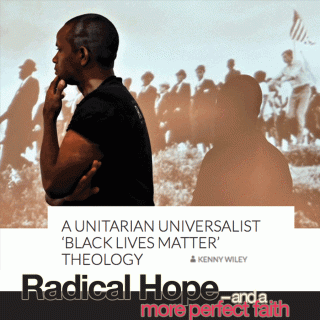Radical Hope and a More Perfect Faith

KSW_Radical_Hope
We post an excerpt of this important post by Kenny S. Wiley, Director of Faith Formation at Prairie UU Church in Parker, Colorado and UU World contributor. Read the full text of Kenny S. Wiley's post tracing the history of Unitarian Universalist rejection of racism, and the call of UU history for Unitarian Universalists to make #BlackLivesMatter now, on his blog "A Full Day", here. - ed.
A Unitarian Universalist ‘Black Lives Matter’ Theology
by Kenny Wiley, March 26, 2015 “If, while I hear the wild shriek of the slave mother robbed of her little ones, I do not open my mouth, am I not guilty?” –Lucy Stone In the Denver community I strive to be a racial justice activist. Whenever I introduce myself in justice circles, I say that my Unitarian Universalist faith informs my work. “My faith,” I have said, “calls me to proclaim that black lives matter—that my life matters.” Deep down I’ve been asking myself: Is that true? I knew that I felt called; was it Unitarian Universalism calling me here? The questions lingered even as dozens of UUs joined me at Denver’s ‘Selma Sunday’ gathering of 275, and as hundreds descended upon Alabama to commemorate the fiftieth anniversary of the deaths of Jimmie Lee Jackson, Viola Liuzzo, and James Reeb. The doubts remained because of the hateful and/or ignorant comments some Unitarian Universalists have sent my way since I joined the racial justice movement. The doubts remained because of the silence and seeming indifference I’ve felt from some of my fellow UUs, even as others have gotten quite involved. I needed a Unitarian Universalist Black Lives Matter theology. I needed more than the First Principle—I needed to dive into our history and our theology and find the deeds, words, and voices that could help me feel theologically grounded in racial justice work. In The Larger Hope, Russell Miller writes, “When Universalists opposed to slavery first undertook to launch a campaign to [stop] it, one of their first steps was to cast back over their own history to find support.”– – –
To fight for black lives now is to participate in radical hope. It is to battle for salvation on this Earth. It is to fight for life, for love, for justice. It is to demand more out of the first principle. It is to demand a more perfect faith.Read the full text of Kenny S. Wiley's post on his blog "A Full Day", here. Read the post by Rev. Elizabeth Nguyen describing events referenced in Kenny Wiley's post here.